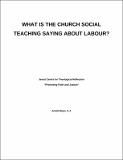What is The Church’s Social Teaching Saying About Labour?
Abstract
Ever since the origin of human life, human beings have had to work for their upkeep and survival. However, unlike pre-historic times where labour was mostly of an informal, subsistence, and individualised nature, today it has become more complex and formalised, with people having to seek paid work for their sustenance. Because of the importance of work in the well-being of every human being, governments in almost all countries have made employment creation a development objective in their national planning, although with different levels of commitment and success. Yet despite the necessity of paid work, many people remain unemployed, and those that are employed do not always work under good conditions or get decent and just salaries. The
employment situation in Zambia is dire. Out of a labour force of 5, 413,518, only 522,761(9.7%) people are employed in the formal sector, with the remaining 4, 699,585 (90.3%) being in informal employment where they are either paid very low wages, paid irregularly, or not paid at all.
Description
Work is a fundamental right and a good for mankind, a useful good, worthy of man because it is an appropriate way for him to give expression to and enhance his human dignity. The Church teaches the value of work not only because it is always something that belongs to the person but also because of its nature as something necessary. Work is needed to form and maintain a family, to have a right to property and to contribute to the common good of the human family (Compendium of the Social Doctrine of the Church).
